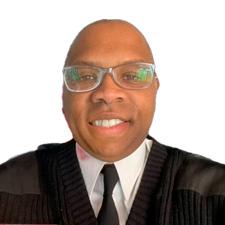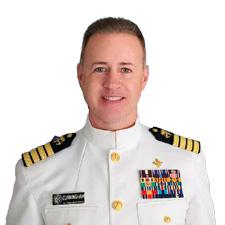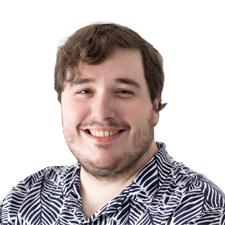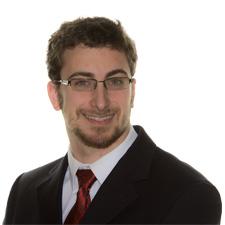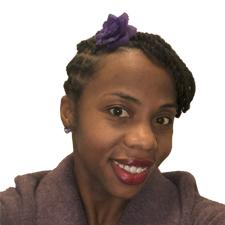Explore Life at CDRH
CDRH offers an array of career opportunities, and we value the expertise that our employees possess. Because of these highly skilled individuals, the FDA can successfully protect and promote public health.
As a prospective employee, you may be wondering what it’s like to work at CDRH. Our high-performing, diverse workforce will tell you in their own words.
CDR Daniel Bailey, USPHS
- Assistant Director, Committee Management and Planning (CMP), Office of Management (OM)
-
Q: When did you join CDRH?
A: I joined CDRH in March 2020, at the beginning of the COVID-19 pandemic.
-
Q: What do you do at CDRH?
A: As Assistant Director of CMP, I oversee CDRH’s advisory committees (ACs), which provide the FDA/CDRH with independent advice from scientific and medical experts, as well as industry, consumer, and patient representatives. ACs offer input on various issues, including the evaluation of drugs, medical devices, and public health topics. They serve as a crucial resource for FDA/CDRH subject-matter experts, providing insights on data interpretation, product safety, and the risks and benefits of interventions.
-
Q: What are you most proud of in terms of your work at CDRH?
A: I take pride in our efforts to enhance the advisory meeting experience for all stakeholders. Our team has achieved an impressive customer satisfaction rating of 4.75 out of 5. We have prioritized diversity, ensuring our advisory committees reflect the nation’s demographics, which enriches discussions and decision-making processes.
-
Q: How would you describe CDRH in one word?
A: Caring. This word encapsulates the core values of CDRH, emphasizing our commitment to public health and safety. The organization focuses on understanding and meeting the needs of stakeholders, fostering a supportive environment for collaboration, and ensuring that the voices of diverse groups are heard in discussions about medical devices.
-
Q: What skills have you found vital to your job?
A: Empathy is the most vital skill in my role. By understanding and considering the perspectives of our stakeholders, I can better address their needs while ensuring our office delivers exceptional service. This empathy cultivates trust and rapport, allowing us to navigate complex Federal Advisory Committee Act (FACA) regulations effectively and maintain our standing as a premier advisory body in the FDA.
CAPT Bradley Cunningham, USPHS
- Associate Office Director, Office of Health Technology 1 (OHT1), Office of Product Evaluation and Quality’s (OPEQ)
-
Q: When did you join CDRH?
A: I joined CDRH in 2003.
-
Q: What do you do at CDRH?
A: I began my FDA career as a medical device reviewer in the field of ophthalmic implants, where I developed a strong foundation in the regulation of complex medical technologies. Over the years, I have held many leadership roles overseeing the regulation of complex medical devices and managing complicated regulatory issues in both pre- and post-market roles. Currently, as Associate Office Director for OHT1, I oversee various regulatory activities for four medical panels across three divisions and serve as the Office-Lead for digital health products and opioid devices. In my role, I am able to apply strategic leadership and facilitate cross-disciplinary collaboration to advance regulatory decision making. This experience has uniquely positioned me to shape policies that address both immediate safety concerns and the long-term evolution of medical technologies to ensure safe, effective, and responsible innovation in medical devices.
-
Q: What are you most proud of in terms of your work at CDRH?
A: I am incredibly proud of the work I've contributed to during my 20+ years with CDRH. Through close collaboration with a diverse array of stakeholders, including industry leaders, academic institutions, clinical professionals, professional societies, and other government agencies, I have helped shape forward-thinking policies and advance scientific research that streamlines medical device development and fosters innovation. More recently, I had the privilege of co-leading the development of a regulatory framework designed to address the evolving nature of machine learning technologies, ensuring that innovation in this space remains safe and beneficial for patients and healthcare providers alike.
-
Q: How would you describe CDRH in one word?
A: For me, that one word would be “innovative.” The work we do is not only at the forefront of medical technology, but also at the cutting edge of advancing regulatory science. By evolving our review practices with the rapid development of new devices we enhance our ability to address emerging challenges and drive health care innovation, remaining both a catalyst for progress and a protector of public health. Our continual innovation extends beyond CDRH, creating transformative impacts on public health and clinical practice.
-
Q: What skills have you found vital to your job?
A: Technical expertise and an analytical mindset are certainly useful skills, but I have also found that being a “people person” is just as vital to effectively lead multidisciplinary teams in a diverse work environment. Flexibility is also key in addressing new challenges as they arise, and humility helps foster an open and collaborative atmosphere where innovative solutions can thrive.
Ron Fortunato
- Scientific Reviewer, Office of In Vitro Diagnostics (OHT7), Office of Product Evaluation and Quality’s (OPEQ)
-
Q: What do you do at CDRH?
A: As a Scientific Reviewer in the diabetes branch of the Division of Chemistry and Toxicology in OHT7, I review premarket and post-market submissions by our industry sponsors.
-
Q: What made you want to work with medical devices that manage and treat diabetes?
A: There are 37 million adults with type 2 diabetes (T2D) in the United States. I am motivated by the possibly of making a positive impact on this group. The level of trust and dependance type 1 diabetics (T1D) place on insulin pump manufactures motivates me to be an advocate for these people and their families.
-
Q: What do you like most about working at CDRH?
A: It has been a great collaborative experience working with fellow reviewers, medical officers, analysts, and other CDRH employees.
-
Q: What skills have you found vital to your job?
A: I think flexibility to pivot has been vital and openness to learn new things.
Alexander Herman
- Staff Fellow, Office of Science and Engineering Laboratories (OSEL)
-
Q: When did you join CDRH?
A: I joined in November 2015 for an internship in the Office of Product Evaluation and Quality (OPEQ).
-
Q: What do you do at CDRH?
A: I am a mechanical engineer in the Division of Applied Mechanics in OSEL working on a variety of different research projects and initiatives. Currently, I am working on research projects involving evaluating microfluidic devices and their connectors, in addition to the neonatal intensive care unit (NICU) incubators, and volatile organic compounds (VOC) emissions.
I am also one of the Center’s representatives for the FDA’s Advisory Committee for Employees with Disabilities, which advises on policies, issues, and concerns impacting employees with disabilities and provides a communication channel between FDA employees and leadership. Any opportunity I can use to help other colleagues who are neurodivergent is gratifying for me. I am happy to talk to anyone and answer any questions about these efforts.
- Q: What skills have you found vital to your job?
A: Several skills are vital to this job, including:
-
Knowing how to navigate the different information technology (IT) and communication systems, and how to use them effectively.
-
Understanding from a scientific perspective how to script in MATLAB, Visual Basic for Applications (VBA), Python, or Power Query to help make some of the repetitive tasks easier.
-
Learning how to make documents and presentations 508 compliant is one skill that I have been working on and have found to be very important.
-
-
Q: What makes public service important to you?
A: The work I do has the potential to improve the lives and well-being of patients and can directly improve public health policy. This makes my job feel important to me.
Astin Ross
- Senior Science Health Advisor, Office of Strategic Partnerships and Technology Innovation (OST)
-
Q: When did you join CDRH?
A: I joined CDRH in the spring of 2016 as a Staff Fellow.
-
Q: What do you do at CDRH?
A: As a Senior Science Health advisor in the immediate office of OST, I lead and manage Center-level projects in the areas of regulatory science, post-market signal response, and collaborative innovation to improve public health.
-
Q: What do you love about working at CDRH?
A: I love so much about working at CDRH. The public health mission, my wonderful, hard-working colleagues, and the opportunity to work on a variety of projects that enable me to leverage and cultivate a broad range of skillsets.
-
Q: What skills have you found vital to your job?
A: The skills that I have found vital to my job are communication, project management, and group/meeting facilitation. Of these, communication is most crucial to everything I do whether that is clarifying deliverables with a project team, helping colleagues understand the implications of organizational changes, engaging with external stakeholders, or championing ideas to help make CDRH an even more outstanding place to work.

